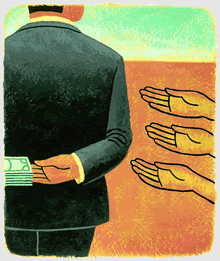 Money laundering harms innocent individuals but can also impose serious costs on national economies
CARTONS of cash in the Kabul airport, a strategically placed teller’s window just before immigration in Antigua, and some lines of code in accounting software in a bank in the Dominican Republic—seemingly unrelated phenomena, but all part of the global problem of money laundering. And all are linked to financial sector failures that led to real economic hardship for law-abiding citizens in the countries involved.
Money laundering is the process that transforms illegal inputs into supposedly legitimate outputs. Proceeds gained by crimes such as fraud, theft, and drug trafficking are made to look as if they were the fruits of honest hard labor—transformed, for instance, into legitimate-looking bank accounts, real estate, or luxury goods. This allows criminals to prosper from their crimes and live their lives without looking like criminals. Moreover, they can use these laundered proceeds to expand their criminal enterprises, thereby increasing their wealth and power, including the power to corrupt and buy protection from the political and law enforcement establishment.
See full Article.
Money laundering harms innocent individuals but can also impose serious costs on national economies
CARTONS of cash in the Kabul airport, a strategically placed teller’s window just before immigration in Antigua, and some lines of code in accounting software in a bank in the Dominican Republic—seemingly unrelated phenomena, but all part of the global problem of money laundering. And all are linked to financial sector failures that led to real economic hardship for law-abiding citizens in the countries involved.
Money laundering is the process that transforms illegal inputs into supposedly legitimate outputs. Proceeds gained by crimes such as fraud, theft, and drug trafficking are made to look as if they were the fruits of honest hard labor—transformed, for instance, into legitimate-looking bank accounts, real estate, or luxury goods. This allows criminals to prosper from their crimes and live their lives without looking like criminals. Moreover, they can use these laundered proceeds to expand their criminal enterprises, thereby increasing their wealth and power, including the power to corrupt and buy protection from the political and law enforcement establishment.
See full Article.
Monday, June 25, 2012
Dirty Money, Real Pain
 Money laundering harms innocent individuals but can also impose serious costs on national economies
CARTONS of cash in the Kabul airport, a strategically placed teller’s window just before immigration in Antigua, and some lines of code in accounting software in a bank in the Dominican Republic—seemingly unrelated phenomena, but all part of the global problem of money laundering. And all are linked to financial sector failures that led to real economic hardship for law-abiding citizens in the countries involved.
Money laundering is the process that transforms illegal inputs into supposedly legitimate outputs. Proceeds gained by crimes such as fraud, theft, and drug trafficking are made to look as if they were the fruits of honest hard labor—transformed, for instance, into legitimate-looking bank accounts, real estate, or luxury goods. This allows criminals to prosper from their crimes and live their lives without looking like criminals. Moreover, they can use these laundered proceeds to expand their criminal enterprises, thereby increasing their wealth and power, including the power to corrupt and buy protection from the political and law enforcement establishment.
See full Article.
Money laundering harms innocent individuals but can also impose serious costs on national economies
CARTONS of cash in the Kabul airport, a strategically placed teller’s window just before immigration in Antigua, and some lines of code in accounting software in a bank in the Dominican Republic—seemingly unrelated phenomena, but all part of the global problem of money laundering. And all are linked to financial sector failures that led to real economic hardship for law-abiding citizens in the countries involved.
Money laundering is the process that transforms illegal inputs into supposedly legitimate outputs. Proceeds gained by crimes such as fraud, theft, and drug trafficking are made to look as if they were the fruits of honest hard labor—transformed, for instance, into legitimate-looking bank accounts, real estate, or luxury goods. This allows criminals to prosper from their crimes and live their lives without looking like criminals. Moreover, they can use these laundered proceeds to expand their criminal enterprises, thereby increasing their wealth and power, including the power to corrupt and buy protection from the political and law enforcement establishment.
See full Article.



